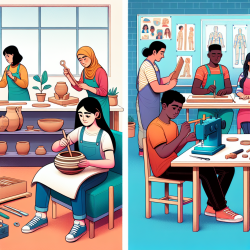Introduction
In the ever-evolving landscape of healthcare, practitioners are constantly seeking innovative approaches to improve patient outcomes, especially for complex conditions like diabetes and depression. The recent research article, "Behavioral health coaching for rural-living older adults with diabetes and depression: an open pilot of the HOPE Study," offers valuable insights into how behavioral health coaching can be a game-changer for practitioners working with rural populations.
The HOPE Study: An Overview
The HOPE Study explored the feasibility and effectiveness of a telephone-delivered coaching intervention aimed at rural-dwelling older adults with uncontrolled diabetes and clinically significant depressive symptoms. The intervention, known as Healthy Outcomes through Patient Empowerment (HOPE), consisted of ten sessions over 12 weeks, focusing on both physical and emotional health.
Key outcomes of the study included significant improvements in diabetes control (measured by HbA1c), depressive symptoms (measured by PHQ-9), and diabetes-related distress (measured by PAID). These improvements were sustained over a six-month follow-up period, showcasing the potential of the HOPE intervention as a complementary approach to traditional primary care.
Implications for Practitioners
For practitioners, the HOPE Study underscores the importance of integrating behavioral health coaching into patient care, particularly for those in rural settings. Here are some ways practitioners can enhance their skills and patient outcomes by leveraging insights from the study:
- Embrace Telehealth: The telephone-based nature of the HOPE intervention highlights the potential of telehealth to reach patients in remote areas. Practitioners should consider incorporating telehealth solutions to expand their reach and provide continuous support to patients.
- Focus on Patient Empowerment: The HOPE Study emphasized patient-centered approaches, encouraging goal-setting and action planning. Practitioners can enhance patient engagement by empowering them to take an active role in their health management.
- Address Both Physical and Emotional Health: The dual focus on diabetes and depression in the HOPE intervention highlights the need for a holistic approach to patient care. Practitioners should strive to address both physical and emotional aspects of health in their treatment plans.
- Utilize Non-Expert Coaches: The study demonstrated the effectiveness of using non-expert coaches for delivering behavioral health interventions. Practitioners can consider training paraprofessionals or community health workers to extend their care teams and provide additional support to patients.
Encouraging Further Research
While the HOPE Study provides promising results, it also opens the door for further research. Practitioners are encouraged to explore additional studies to validate and expand upon the findings. Areas for future research could include:
- Long-term effectiveness of behavioral health coaching in diverse populations.
- Integration of telehealth solutions in routine clinical practice.
- Development of scalable training programs for non-expert coaches.
Conclusion
The HOPE Study offers a compelling case for the integration of behavioral health coaching in managing complex conditions like diabetes and depression. By embracing telehealth, focusing on patient empowerment, and addressing both physical and emotional health, practitioners can enhance their skills and improve patient outcomes. As the healthcare landscape continues to evolve, ongoing research and innovation will be key to unlocking new possibilities for patient care.
To read the original research paper, please follow this link: Behavioral health coaching for rural-living older adults with diabetes and depression: an open pilot of the HOPE Study.










